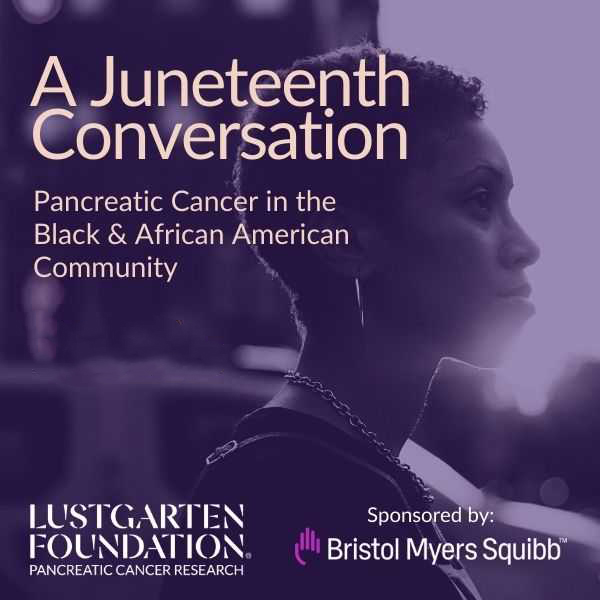A Juneteenth Conversation:
Health Disparities in Pancreatic Cancer
Topic: The Researchers

By Kerri Kaplan
On the heels of Juneteenth being named a federal holiday, Avery Posey, PhD, the inaugural recipient of the Lustgarten Foundation Career Development Award honoring Congressman John R. Lewis gave an excellent talk on the importance of health equity in pancreatic cancer research and treatment. Black people and African Americans experience both higher incidence and death rates from pancreatic cancer than other populations. There are a variety of causes of health disparities, including behavioral and lifestyle factors, genetics, and access to quality and effective healthcare treatment. The following is a brief synopsis of Dr. Posey’s presentation. To watch the webinar in its entirety, visit the Lustgarten Foundation YouTube channel.
Social and Economic Inequities
In addition to a distrust of medical research, Blacks and African Americans often have limited access to academic medical institutions where research influences clinical care. A study published in the journal Pancreas in 2019 showed that of 8,700 patients participating in trials related to 28 cancer drugs approved by the FDA in 2018 and 2019, African Americans made up 13% of the US population but only 4% of those who participated in these trials.
The Perelman Cancer Center at the University of Pennsylvania, where Dr. Posey is an Assistant Professor of Pharmacology, established a center-wide program to address these gaps. In 2014, Black residents comprised 19% of the population and 16.5% of cancer cases in the catchment area surrounding Philadelphia, but only 11.1% of Perelman patients were Black. The percentages of Black participants accrued onto treatment, non-therapeutic interventional, and non-interventional trials were 12.2%, 8.3% and 13.0%, respectively.
To increase the number of Black participants, the institution:
- Created culturally tailored marketing strategies for cancer clinical trials
- Planed each trial protocol to facilitate Black participant enrollment
- Developed new partnerships with faith-based organizations serving Black communities to conduct educational events about clinical trials
- Piloted programs with Lyft and Ride Health to address transportation barriers.
- Instituted nurse navigator-led patient education programs
- Improved informed consent process
The program produced excellent results. The percentage of Black patients seeking care increased to 16.2%—matching the percentage of Black cancer patients among all cancer cases in the catchment area. Total cancer clinical trial accrual had increased nearly 42% from 9,308 participants in 2014 to 13,170 in 2018. The percentages of Black participants accrued onto treatment, non-therapeutic interventional, and non-interventional trials were 23.9%, 33.1%, and 22.5%, respectively—a 1.7-to 4.0-fold increase in five years. Undertaking a comprehensive, thoughtful program clearly made a difference.
Risk Factors
Long-term diabetes is a risk factor for pancreatic cancer and new onset diabetes in an older person can be the first sign of pancreatic cancer. An estimated 16.4% of blacks have diabetes compared to 11.9% of whites. In fact, up to 80% of patients with pancreatic cancer are either prediabetic or are in a pre-symptomatic phase of diabetes. People who are significantly overweight are more likely to develop pancreatic cancer compared with those who are not overweight. Blacks people are 1.4 times more likely to be obese compared to whites.
Smoking or being exposed to secondhand smoke is the leading preventable cause of pancreatic cancer. People who smoke have twice the chance of getting pancreatic cancer compared with people who do not smoke. While smoking rates do not differ between individuals of black and white races, 77% of black smokers consume menthol and high-tar cigarettes—three times the rate of white smokers. Studies show cigarettes containing menthol increase the likelihood of smoking, decrease cessation and are more difficult to quit than non-menthol cigarettes.
Genetics
While there are some known inherited genes found more frequently in blacks, more information is required to understand if this contributes to the disparity.
In March 2021, the Lustgarten Foundation funded a study led by Howard Crawford, PhD, Professor of Molecular & Integrative Physiology and Internal Medicine at the Henry Ford Cancer Institute, to analyze the genomic basis for disparities in pancreatic cancer in African American patients. Dr. Crawford will study approximately 200 samples with a minimum of half from African American patients.
This work will create a one-of-a-kind data set identifying potential mechanisms driving the higher incidence and poorer prognosis of pancreatic cancer in African American patients and will lay the groundwork for determining new approaches to better treat pancreatic cancer in this population.
Under Represented Minorities in Science
A study from The National Science Foundation found individuals from racial and ethnic groups are underrepresented in health-related sciences. Black people comprise 13% of the US population, but only 3% of oncologists. Research indicates sharing a common racial or cultural background with one’s doctor helps promote communication and trust.
Juneteenth
Juneteenth is a day to reflect on how far we have come as a country and how much more must be done. Dr. Posey dedicates his work in pancreatic cancer to his aunt who died of pancreatic cancer in early 2021. “We can’t go on leaving people behind based on race, the color of their skin. That’s something that he (John Lewis) fought for and if I can in some way make a change in the sciences, I think it will benefit those potential younger scientists who look at me and maybe see themselves. There’s still too few minorities involved in the sciences, and we need to make science a real pathway for these young, great minds.”
July 17 marked the one-year anniversary of the passing of the Civil Rights icon and 17-term Georgia Congressman John Lewis from pancreatic cancer. In honor of Dr. Posey’s aunt, John Lewis, and all those lost to and currently fighting pancreatic cancer, we stand committed to making pancreatic cancer a curable disease for all.

The Lustgarten Foundation Career Development and Genomic Basis for Disparities in Pancreas Cancer in
African American Patients Awards are made possible in part by the generous support of Bristol Myers Squibb.
